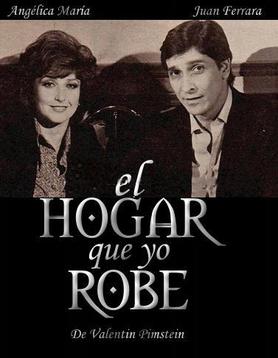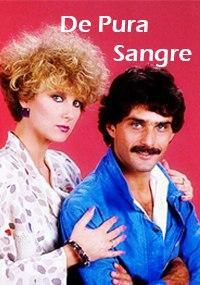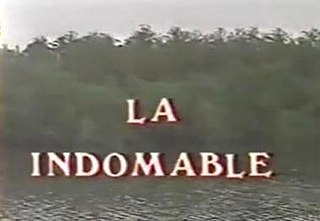Ramona is a Mexican telenovela produced by Lucy Orozco for Televisa based on the 1884 novel Ramona by Helen Hunt Jackson. It premiered on April 3, 2000 and ended on July 14, 2000. The series stars Kate del Castillo, Eduardo Palomo, Helena Rojo, René Strickler and Sergio Sendel. It was the last telenovela of Eduardo Palomo, who died in 2003 of a heart attack.
Alcanzar una estrella II is a Mexican telenovela produced by Luis de Llano Macedo for Televisa in 1991. It is the sequel to Alcanzar una estrella.

Angélica Espinoza Stransky, known as Angélica Aragón, is a Mexican film, television and stage actress and singer. She is daughter of the Mexican composer José Ángel Espinoza "Ferrusquilla". She is recognized for her performances in various Mexican film productions such as Cilantro y perejil (1997), Sexo, pudor y lágrimas (1999) and El crimen del Padre Amaro (2002) and in diverse American productions like A Walk in the Clouds (1995) and Dirty Dancing: Havana Nights (2002) among others. She is also famous for having starred in two famous Mexican telenovelas: Vivir un poco (1985) and Mirada de mujer (1997).

Lazos de amor is a Mexican telenovela produced by Carla Estrada for Televisa in 1995. It stars Lucero and Luis José Santander.

Muchachitas como tú is a teen Mexican telenovela produced by Emilio Larrosa for Televisa in 2007. It is an adaption of the Mexican telenovela Muchachitas, also produced by Emilio Larrosa. It premiered on April 23, 2007 and ended on November 9, 2007.
La antorcha encendida is a Mexican telenovela produced by Ernesto Alonso and Carlos Sotomayor for Televisa in 1996. It was the last historical telenovela produced by Televisa. The plot tells the Independence of Mexico, with an emphasis on historical accuracy. It was written by Fausto Zeron Medina in collaboration with Liliana Abud. It premiered on Canal de las Estrellas on May 6, 1996 and ended on November 15, 1996.
Principessa is a Mexican telenovela produced by Valentín Pimstein for Televisa in 1984. The telenovela about the adventures and misadventures of a group of friends Paola, Fernanda, Marisela and Adriana working as stylists in the salon "Princess".
Juana Iris is a Mexican telenovela produced by Carlos Téllez and Lucero Suárez for Televisa in 1985.
Atrapada (Trapped) is a Mexican telenovela produced by Ernesto Alonso for Televisa in 1991.
Barata de primavera is a Mexican telenovela produced by Valentín Pimstein for Televisa in 1975.

El hogar que yo robé is a Mexican telenovela produced by Valentín Pimstein for Canal de las Estrellas in 1981.
Por amor is a Mexican telenovela produced by Irene Sabido for Televisa in 1981. It is an original story by Rita Valencia and Manuel de la Rosa. It starred by María Sorté, Manuel Ojeda, Adriana Roel, Carlos Cámara, Chela Nájera and Salvador Sánchez.

De pura sangre is a Mexican telenovela produced by Ernesto Alonso for Televisa in 1985. Its original story of María Zarattini and directed by José Rendón.

La Indomable is a Mexican telenovela produced by Julissa for Televisa in 1987. The story portrays a female version of the play "The Taming of the Shrew" by English playwright William Shakespeare.
La gloria y el infierno is a Mexican telenovela produced by Gonzalo Martínez Ortega and Juan Osorio for Televisa in 1986. It is based on the novela Duelo al so by the American writer Niven Busch. It starred Ofelia Medina, Héctor Bonilla, Fernando Balzaretti and Saby Kamalich.

Yo compro esa mujer is a Mexican telenovela produced by Ernesto Alonso for Televisa in 1990. Based on the novel "The Count of Monte Cristo" by Alexandre Dumas, created by Olga Ruilópez and adapted by Liliana Abud.
Carrusel de las Américas is a Mexican Children's telenovela produced by Valentín Pimstein for Televisa in 1992. It is both a sequel and remake of 1989 telenovela Carrusel. Chain member of the memorial project Americas 500 years since the discovery of America. It was shown via satellite to Latin America as part of that program block.
María José is a Mexican telenovela produced by Juan Osorio for Televisa in 1995.
Desencuentro is a Mexican telenovela produced by Ernesto Alonso for Televisa in 1997.
Marisol Santacruz Bañuelos is an actress, comedian, hostess, model, and a former winner of Rostro de El Heraldo, a beauty contest for the Mexican newspaper El Heraldo.







